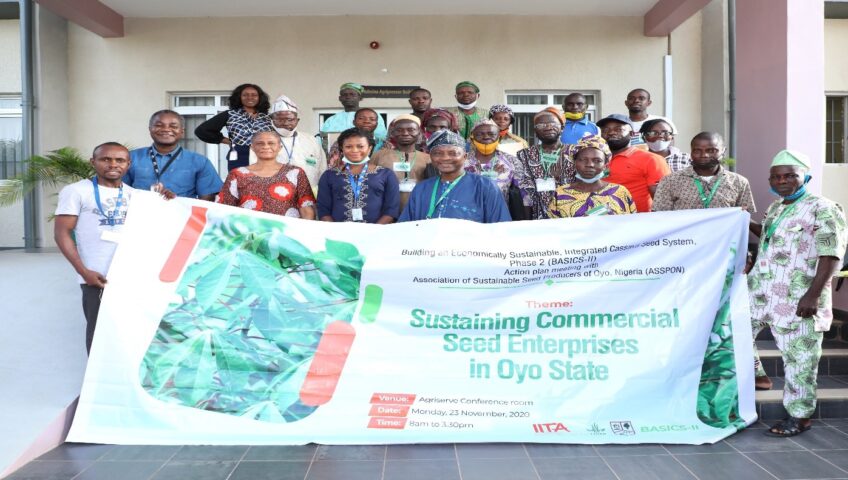Cassava seed producers in Oyo state, Nigeria, have set up a one-year plan to build the capacity of their members to enable them to play a leading role in the country’s emerging cassava seed system. The plan was put together at a workshop facilitated by the Building an Economically Sustainable, Integrated Cassava Seed System, Phase 2 (BASICS-II) project for seed producers under the auspices of the Association of Sustainable Seed Producers of Oyo, Nigeria (ASSPON).
The workshop tagged: “Sustaining Commercial Seed Enterprises in Oyo State”, was held in IITA Ibadan, on Tuesday 23 November 2020.
In his welcome address, the Project Manager of BASICS-II, Prof Lateef Sanni, stated that BASICS-II wanted ASSPON to be in a strategic position to multiply and disseminate improved and disease-free cassava seeds to root farmers.
“Our wish is for your association to have the capacity to serve the country in the cassava seed sector,” he said.
Prof. Sanni who commended ASSPON for having a functional constitution and an organized structure, urged members to maintain unity within the group, stressing that the association’s constitution could serve as a template for the formation of a national body.
Also addressing the participants, Godwin Atser, IITA Advocacy, Promotion and Outreach Lead of BASICS-II, lauded the group for taking action to empower its members and build their capacity without having to wait for government’s intervention or funding.
He pledged that BASICS-II would link ASSPON to the National Agricultural Seed Council (NASC) and work with the association to get their farms certified. He also advised participants to familiarize themselves with the newly renamed cassava varieties.
During the workshop facilitated by Hannah Anighoro of Esto Perpectua Development Initiative (EPDI), Lagos, participants developed a one-year action plan to build a strong, vibrant and sustainable association.
The actions were grouped into five areas with five taskforces created to be in charge of each area.
Some of the activities set for the year 2021 include: advocacy visits by ASSPON to NASC to discourage uncertified roadside stem sellers; translation of the association’s constitution into Yoruba Language; and enlightenment of farmers on improved varieties. Training of members and engaging in income-enhancing activities were also part of the plan.
The members, led by the chairman, Mr. Muritala Adeleke, envisioned that in the next one year, ASSPON would be stronger and more farmers would be willing to buy and plant only cassava stems of improved varieties. They also expressed optimism that the one-year plan would contribute to making cassava seed business a more profitable venture.

